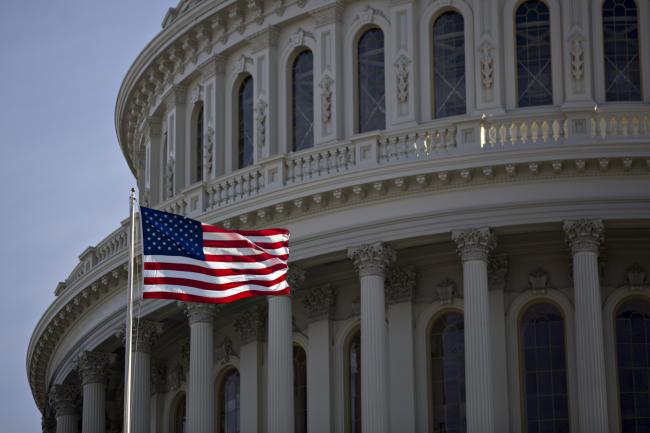(Bloomberg) -- The U.S. budget deficit will surpass $1 trillion by 2020, two years sooner than previously estimated, as tax cuts and spending increases signed by President Donald Trump do little to boost long-term economic growth, according to the Congressional Budget Office.
Spending will exceed revenue by $804 billion in the fiscal year ending Sept. 30, jumping from a projected $563 billion shortfall forecast in June, the non-partisan arm of Congress said in a report Monday. In fiscal 2019, the deficit will reach $981 billion, compared with an earlier projection of $689 billion.
Deficits were only set to surpass the trillion-dollar level in fiscal 2022 under CBO’s report last June.
The U.S. cumulative deficit -- taking into account the new tax and spending legislation -- will be $11.7 trillion from 2018 to 2027, about $1.6 trillion larger than the CBO projection in June. The CBO forecast 2 percent less revenue and 1 percent more spending over the period, it said.
The tax-cut and spending legislation “provide fiscal stimulus, raising real GDP more than potential GDP in the near term,” the CBO said. “Over the longer term, all of those effects, as well as the larger federal budget deficits resulting from the new laws, exert upward pressure on interest rates and prices.”
Revenue Shortfall
Deficits are growing as the Trump administration enacted a tax overhaul this year that will lower federal revenue by more than a $1 trillion over the next decade and Congress approved a roughly $300 billion spending increase. The fresh CBO estimates could heighten investor worries as they weigh the potential impact that tariff threats between the U.S. and China may have on the world economy.
Even before the latest fiscal measures, the U.S. budget gap was predicted to increase as an aging American population puts pressure on health care and retirement programs.
The Trump administration has said tax cuts will lead to faster economic growth that would offset deficit expansion.
CBO estimated that real gross domestic product will expand by 3.3 percent in the 2018 calendar year, before slowing to 2.4 percent in 2019 and 1.8 percent in 2020, based on the fourth quarter year-over-year figure. In June, CBO forecast 2 percent growth this year.
“During the 2020-2026 period, a number of factors dampen economic growth: higher interest rates and prices, slower growth in federal outlays, and the expiration of reductions in personal income tax rates,” CBO said.
Economic Growth
The report sees unemployment declining to 3.3 percent in 2019 on an annual average, from 3.8 percent this year.
CBO Director Keith Hall will testify about the report this week before the House and Senate budget committees.
Congress isn’t planning to enact any major deficit-cutting legislation before the November midterm elections. While the House will draft a budget resolution, the Senate has indicated it won’t take one up. Without the fast-track budget reconciliation, there is no chance entitlement cuts conservative Republicans are seeking can be enacted because Democrats can employ a Senate filibuster.
The House plans a symbolic vote on a balanced budget amendment in the coming weeks and is also discussing bringing forward a package to cancel some of the domestic spending increases from the omnibus spending bill.
Little Chance
Those increases were put in the bill at the request of Democrats since the legislation required Senate Democratic votes to pass. Analysts see little chance of enactment for the legislation, which would undermined the ability of Republican leaders to negotiate future bipartisan deals, even though it can clear the Senate with just 50 Republican votes.
The CBO baseline represents what it projects will happen if current law is allowed to remain in effect. CBO assumes that budget caps on annual appropriations, which Congress has raised regularly, remain in effect. Because of that, deficits are likely to be even larger than CBO is projecting.
